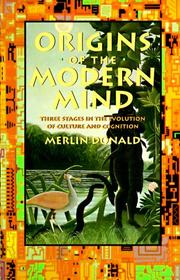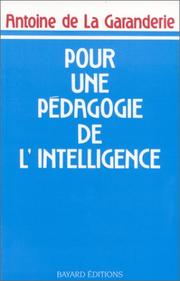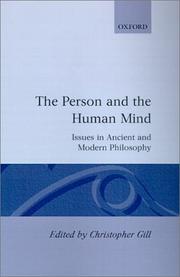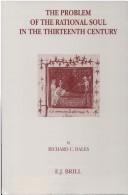| Listing 1 - 5 of 5 |
Sort by
|

ISBN: 0674644840 0674644832 9780674644847 9780674644830 Year: 1991 Publisher: Cambridge (Mass.) : Harvard university press,
Abstract | Keywords | Export | Availability | Bookmark
 Loading...
Loading...Choose an application
- Reference Manager
- EndNote
- RefWorks (Direct export to RefWorks)
This bold and brilliant book asks the ultimate question of the life sciences: How did the human mind acquire its incomparable power? In seeking the answer, Merlin Donald traces the evolution of human culture and cognition from primitive apes to artificial intelligence, presenting an enterprising and original theory of how the human mind evolved from its presymbolic form.
Cognition and culture --- Neuropsychology --- Cognition --- Intellect --- History --- Cognitie en cultuur --- Psychologie [Neuro] --- Human intelligence --- Cognition et culture --- Intelligence --- Neuropsychologie --- History. --- Histoire --- Biological Evolution --- Cultural Evolution --- Neurophysiology --- Psychophysiology --- Culture and cognition --- Culture --- Ethnophilosophy --- Ethnopsychology --- Socialization --- Psychology --- Neuropsychologies --- Neuropsychiatry --- Evolution, Cultural --- Cultural Evolutions --- Evolutions, Cultural --- Cognitive Function --- Cognitions --- Cognitive Functions --- Function, Cognitive --- Functions, Cognitive --- Evolution, Biological --- Sociobiology --- Mind --- Ability --- Thought and thinking --- Cognitive psychology --- Biological anthropology. Palaeoanthropology --- Philosophy and psychology of culture --- Cognition and culture. --- Cognition. --- Neuropsychology. --- Intellect - History. --- Intellect - History --- Culture.
Book
ISBN: 2503518184 2503524877 2503524885 2503524893 9782503518183 9782503524870 9782503524887 9782503524894 9782503539850 Year: 2006 Volume: 11 Publisher: Turnhout Brepols
Abstract | Keywords | Export | Availability | Bookmark
 Loading...
Loading...Choose an application
- Reference Manager
- EndNote
- RefWorks (Direct export to RefWorks)
Le XIème Congrès International de Philosophie Médiévale de la Société Internationale pour l’Étude de la Philosophie Médiévale (S.I.E.P.M..) s’est déroulé à Porto (Portugal), du 26 au 30 août 2002, sous le thème général: Intellect et Imagination dans la Philosophie Médiévale. A partir des héritages platonicien, aristotélicien, stoïcien, ou néo-platonicien (dans leurs variantes grecques, latines, arabes, juives), la conceptualisation et la problématisation de l’imagination et de l’intellect, ou même des facultés de l’âme en général, apparaissaient comme une ouverture possible pour aborder les principaux points de la pensée médiévale. Les Actes du congrès montrent que «imagination» et «intellect» sont porteurs d’une richesse philosophique extraordinaire dans l’économie de la philosophie médiévale et de la constitution de ses spécificités historiques. Dans sa signification la plus large, la théorisation de ces deux facultés de l’âme permet de dédoubler le débat en au moins six grands domaines: — la relation avec le sensible, où la fantaisie/l’imagination joue le rôle de médiation dans la perception du monde et dans la constitution de la connaissance; — la réflexion sur l’acte de connaître et la découverte de soi en tant que sujet de pensée; — la position dans la nature, dans le cosmos, et dans le temps de celui qui pense et qui connaît par les sens externes, internes et par l’intellect; — la recherche d’un fondement pour la connaissance et l’action, par la possibilité du dépassement de la distante proximité du transcendant, de l’absolu, de la vérité et du bien; — la réalisation de la félicité en tant qu’objectif ultime, de même que la découverte d’une tendance au dépassement actif ou mystique de toutes les limites naturelles et des facultés de l’âme; — la constitution de théories de l’image, sensible ou intellectuelle, et de ses fonctions.
Philosophy --- anno 500-1499 --- Philosophy, Medieval --- Intellect --- Imagination (Philosophy) --- History --- Intellect (philosophie) --- Imagination (philosophie) --- Philosophie médiévale --- Philosophie médiévale --- Congresses. --- Congrès --- Human intelligence --- Intelligence --- Mind --- Ability --- Psychology --- Thought and thinking --- Philosophy [Medieval ] --- Congresses --- Philosophie médiévale. --- Philosophy, Medieval - Congresses. --- Intellect - History - To 1500 - Congresses. --- Imagination (Philosophy) - History - To 1500 - Congresses. --- Philosophie médiévale.

ISBN: 222712525X 9782227125254 Year: 1990 Publisher: Paris Centurion
Abstract | Keywords | Export | Availability | Bookmark
 Loading...
Loading...Choose an application
- Reference Manager
- EndNote
- RefWorks (Direct export to RefWorks)
Intellect --- Study and teaching --- History --- -Intellect --- -Intelligence Intelligentie --- Didactique Didactiek --- Pédagogie Opvoedkunde --- Human intelligence --- Intelligence --- Mind --- Ability --- Psychology --- Mental retardation --- Thought and thinking --- -History --- Intelligence Intelligentie --- Study and teaching&delete& --- Intellect. --- Intellect - Study and teaching --- Intellect - History --- Intellect - Study and teaching - History

ISBN: 0198244606 Year: 1990 Publisher: Oxford : Clarendon press,
Abstract | Keywords | Export | Availability | Bookmark
 Loading...
Loading...Choose an application
- Reference Manager
- EndNote
- RefWorks (Direct export to RefWorks)
Anthropologie philosophique --- Anthropology [Philosophical ] --- Antropologie [Filosofische ] --- Antropologie [Wijsgerige ] --- Filosofie van de mensheid --- Filosofische antropologie --- Homme (Philosophie) --- Homme -- Philosophie --- Homme [Philosophie de l' ] --- Human intelligence --- Intellect --- Intelligence --- Man (Philosophy) --- Mens (Filosofie) --- Menselijke natuur (Filosofie) --- Mind --- Nature humaine (Philosophie) --- Natuur [Menselijke ] (Filosofie) --- Philosophical anthropology --- Philosophie de l'homme --- Verstand --- Wijsgerige antropologie --- History --- Histoire --- 130.13 --- -Philosophical anthropology --- -#GROL:SEMI-13<09> --- Anthropology, Philosophical --- Civilization --- Life --- Ontology --- Humanism --- Persons --- Philosophy of mind --- Ability --- Psychology --- Mental retardation --- Thought and thinking --- Wijsgerige antropologie: persoon --- Philosophy --- 130.13 Wijsgerige antropologie: persoon --- Intellect. --- History. --- #GROL:SEMI-13<09> --- Philosophical anthropology. --- Philosophical anthropology - History. --- Intellect - History.

ISSN: 09208607 ISBN: 9004102965 900424719X 9789004102965 Year: 1995 Volume: 65 Publisher: Leiden Brill
Abstract | Keywords | Export | Availability | Bookmark
 Loading...
Loading...Choose an application
- Reference Manager
- EndNote
- RefWorks (Direct export to RefWorks)
The Problem of the Rational Soul in the Thirteenth Century traces the Latin scholastics' attempt to deal with two essentially incompatible notions of the human soul: the scientific view of Aristotle which considers it to be a form, and the Augustinian view of the soul as a substance in its own right, from Gundissalinus to the Parisian condemnation of 1277. It traces the growing disarray of Latin notions of the soul, the growth of the monopsychism controversy, the solutions of Bonaventure and Aquinas, through the variety of responses to Aquinas's De unitate intellectus . Among its conclusions are that the traditional dualism diminished with time, that there was little agreement among the “heterodox Aristotelians,” and that, with two exceptions, no one in the thirteenth century taught the present position of the Catholic Church, that the rational soul is infused at conception.
Philosophical anthropology --- History of philosophy --- anno 1200-1299 --- Filosofie [Middeleeuwse ] --- Medieval philosophy --- Middeleeuwse filosofie --- Philosophie médiévale --- Philosophy [Medieval ] --- Philosophy, Medieval --- Soul --- Immortality (Philosophy) --- Philosophy of mind --- Intellect --- History of doctrines --- Islamic influences --- History --- Averroism --- Monopsychism --- -Intellect --- -Philosophy of mind --- -Philosophy, Medieval --- -Soul --- -Thirteenth century --- 13th century --- Middle Ages --- Pneuma --- Future life --- Theological anthropology --- Animism --- Spirit --- Scholasticism --- Mind, Philosophy of --- Mind, Theory of --- Theory of mind --- Philosophy --- Cognitive science --- Metaphysics --- Human intelligence --- Intelligence --- Mind --- Ability --- Psychology --- Mental retardation --- Thought and thinking --- -Immortality (Philosophy) --- -Philosophical anthropology --- Islamic civilization --- Soul - History of doctrines - Middle Ages, 600-1500. --- Immortality (Philosophy) - History. --- Averroism. --- Monopsychism. --- Philosophy, Medieval. --- Islamic influences. --- History. --- Soul - History of doctrines - Middle Ages, 600-1500 --- Philosophy, Medieval - Islamic influences --- Immortality (Philosophy) - History --- Philosophy of mind - History --- Intellect - History
| Listing 1 - 5 of 5 |
Sort by
|

 Search
Search Feedback
Feedback About UniCat
About UniCat  Help
Help News
News